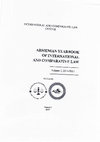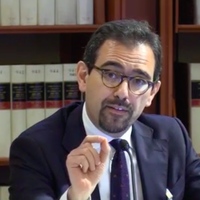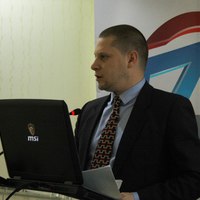Papers by Ani Aghagyulyan

As the consequence of legal amendments made in Armenian legislation, administrative bodies, as we... more As the consequence of legal amendments made in Armenian legislation, administrative bodies, as well as tax authorities, have been empowered with the right to apply to the Judicial acts compulsory enforcement service to collect tax or other penalties without a court decision. The right to collect debts without court decision is given to all administrative bodies, i.e. to tax, customs and road police authorities, which means that each of them in case of administrative, tax or customs legislation violation by citizens can apply to compulsory enforcement body. In this article the author, focusing on the practice of the European court on human rights, the Constitutional court of the Republic of Armenia, as well as Constitutional court of the Russian Federations, the author studies the following questions:
1. Whether the Laws comply with the requirements of human rights protection, and, particularly, protection of right to property and right to fair trial?
2. Whether the law does not impose an excessive burden on individuals and individual entrepreneurs?
3. Whether extension of the Laws on all kinds of administrative debts is lawful?
The article studies freedom of thought, conscience and religion, as one
of human rights and funda... more The article studies freedom of thought, conscience and religion, as one
of human rights and fundamental freedoms. The author analyses Article 9 of European convention on protection of human rights and fundamental freedoms, Article 18 of International covenant on Civil and political rights, decisions on UN Human Rights Committee and European court on human rights and expresses her opinion on restrictions on freedom of religion.

С учетом специфики предметов «История армянской церкви» и «Христианское воспитание», которые преп... more С учетом специфики предметов «История армянской церкви» и «Христианское воспитание», которые преподают детям как один из общеобязательных предметов в Республике Армения, автор статьи исследует проблему соблюдения права родителей воспитывать своих детей в соответствии со своими религиозными и
философскими убеждениями. Для выявления существующих проблем автор рассматривает стандарты преподавания религиоведения, установленные Комитетом по правам человека ООН и Европейским судом по правам человека, а также практику иностранных государств в этом вопросе. В качестве вывода автор выражает свое мнение относительно необходимых изменений в программе предметов в Армении.
Specific subjects “History of Armenian Church” and “Christian education” that is taught to children as one of the compulsory subjects in the Republic of Armenia, the author explores the issue of compliance with the rights of parents to educate their children in conformity with their religious and philosophical beliefs. To identify the existing problems, the author examines the standards of teaching religious studies, established by the human rights Committee of the UN and the European court of human rights, and the practice of foreign countries in this matter. In conclusion, the author expresses his opinion about the changes needed in program objects in Armenia.











Uploads
Papers by Ani Aghagyulyan
1. Whether the Laws comply with the requirements of human rights protection, and, particularly, protection of right to property and right to fair trial?
2. Whether the law does not impose an excessive burden on individuals and individual entrepreneurs?
3. Whether extension of the Laws on all kinds of administrative debts is lawful?
of human rights and fundamental freedoms. The author analyses Article 9 of European convention on protection of human rights and fundamental freedoms, Article 18 of International covenant on Civil and political rights, decisions on UN Human Rights Committee and European court on human rights and expresses her opinion on restrictions on freedom of religion.
философскими убеждениями. Для выявления существующих проблем автор рассматривает стандарты преподавания религиоведения, установленные Комитетом по правам человека ООН и Европейским судом по правам человека, а также практику иностранных государств в этом вопросе. В качестве вывода автор выражает свое мнение относительно необходимых изменений в программе предметов в Армении.
Specific subjects “History of Armenian Church” and “Christian education” that is taught to children as one of the compulsory subjects in the Republic of Armenia, the author explores the issue of compliance with the rights of parents to educate their children in conformity with their religious and philosophical beliefs. To identify the existing problems, the author examines the standards of teaching religious studies, established by the human rights Committee of the UN and the European court of human rights, and the practice of foreign countries in this matter. In conclusion, the author expresses his opinion about the changes needed in program objects in Armenia.
1. Whether the Laws comply with the requirements of human rights protection, and, particularly, protection of right to property and right to fair trial?
2. Whether the law does not impose an excessive burden on individuals and individual entrepreneurs?
3. Whether extension of the Laws on all kinds of administrative debts is lawful?
of human rights and fundamental freedoms. The author analyses Article 9 of European convention on protection of human rights and fundamental freedoms, Article 18 of International covenant on Civil and political rights, decisions on UN Human Rights Committee and European court on human rights and expresses her opinion on restrictions on freedom of religion.
философскими убеждениями. Для выявления существующих проблем автор рассматривает стандарты преподавания религиоведения, установленные Комитетом по правам человека ООН и Европейским судом по правам человека, а также практику иностранных государств в этом вопросе. В качестве вывода автор выражает свое мнение относительно необходимых изменений в программе предметов в Армении.
Specific subjects “History of Armenian Church” and “Christian education” that is taught to children as one of the compulsory subjects in the Republic of Armenia, the author explores the issue of compliance with the rights of parents to educate their children in conformity with their religious and philosophical beliefs. To identify the existing problems, the author examines the standards of teaching religious studies, established by the human rights Committee of the UN and the European court of human rights, and the practice of foreign countries in this matter. In conclusion, the author expresses his opinion about the changes needed in program objects in Armenia.